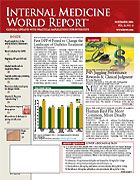Publication
Article
Advise Elderly Patients to Get Annual Flu Vaccine
Author(s):
30% of Older Adults Snowed Under by Respiratory Infections Each Winter
In any given winter, up to 30% of patients aged ≥65 years suffer from acute respiratory infections, most of which are managed by primary care physicians. A new population-based cohort study has now found that annual influenza vaccination can cut the chances of lower respiratory tract infections (LRTIs) by one third in elderly persons who have no comorbidities (Arch Intern Med. 2006; 166: 1980-1985).
Conducted from 1996 to 2002, this study included 26,071 patients (58% women) from the Integrated Primary Care Information database in the Netherlands. All patients were aged ≥65 years on January 1 of the year of study onset. A multivariate Cox proportional hazard model that was adjusted for covariables (ie, age, gender, smoking, and underlying disease) was used to evaluate the risk of LRTI after a first influenza vaccination or revaccination versus no vaccination.
A total of 3412 patients developed LRTIs during follow-up (defined as first LRTI, death, leaving a physician’s practice, or study end). Notably, a first influenza vaccination did not reduce the risk for LRTI during the influenza epidemic periods. Among all the study participants, the hazard ratio after first vaccination was 0.86; hazard ratios in the groups with and without comorbidities were 0.56 and 0.90, respectively.
During periods of flu epidemic, revaccination was found to reduce the risk of LRTIs among patients without comorbidities by 33%, compared with a nonsignificant 5% reduction in those with comorbidities.
Overall, risk for LRTI was greater in men, in those with ≥1 comorbidity, and in smokers and increased with age, report lead investigator Bettie C. G. Voordouw, MD, PhD, and colleagues. The presence of a chronic respiratory disease at study onset was a particularly strong predictor of a subsequent LRTI.
“This study indicates that in a population of community-dwelling elderly individuals, repeated influenza vaccinations may reduce the risk of developing LRTI or pneumonia in years with higher influenza epidemic activity,” the investigators write.
In light of these findings, they recommend offering flu vaccination to this high-risk population to help reduce the incidence not only of influenza, but also of LRTIs during the flu season.






